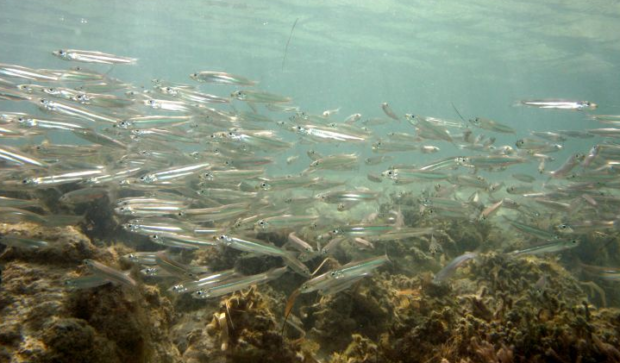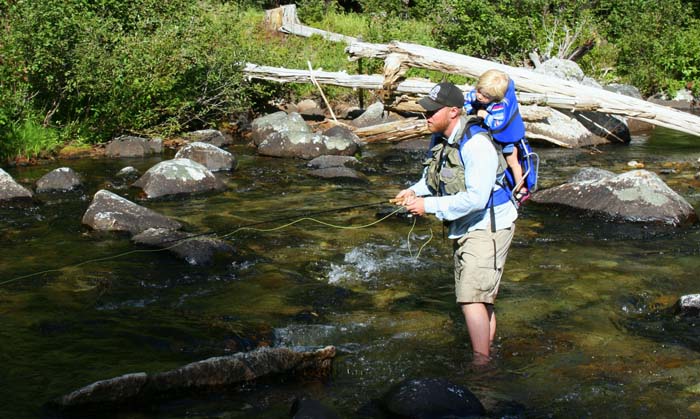
Land Tawney getting some much needed angling advice from the hitch hiker. Tawney is the Executive Director of Backcountry Hunters and Anglers. Photo credit Stalking The Seam.
BHA CEO Receives Fly Fishing Industry Leadership Award
The American Fly Fishing Trade Association presented Backcountry Hunters & Anglers President and CEO Land Tawney with a new industry leadership award, the Jim Range Conservation Leadership Award, at the International Fly Tackle Dealer Show in July, 2018. This is the first year the award was given.
Thousands of fish in Animas River killed by rain runoff carrying ash, debris from 416 fire burn scar
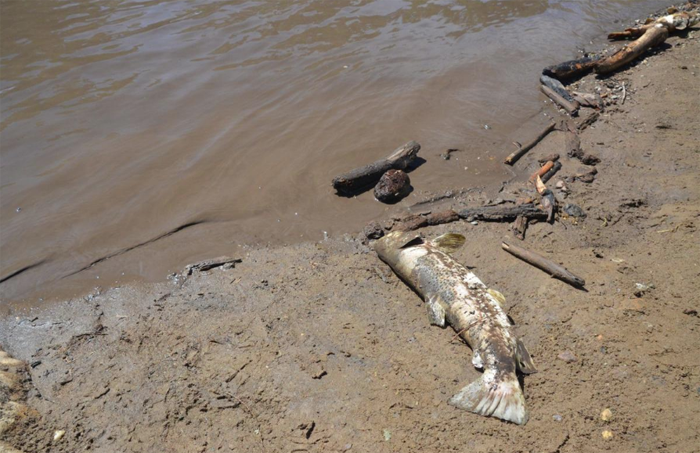
Thousands of fish have been found dead in the Animas River after heavy rains flushed debris and ash from the 416 fire into the river. Photo Colorado Parks and Wildlife.
Ash and debris carried by heavy rains from the 416 fire burn scar into the Animas River north of Durango suffocated thousands of fish, Colorado Parks and Wildlife officials said.
“We’re seeing thousands of fish struggle for their last gasp of air on the river 10 to 15 miles north of Durango, likely down into New Mexico,” said the spokesman for the Southwest Region of Colorado Parks and Wildlife Southwest, Joe Lewandowski. “We can’t even get an exact number because the river is so dark and brown, and we can’t do much about it until the runoff flushes out.”
Lewandowski added that the Animas River has not seen such a massive die-off from wildfire debris runoff in recent memory, though the Missionary Ridge fire wiped out the fish population in the Florida River northeast of Durango in 2002.
Fears that escaped salmon could ‘pollute’ wild stocks on Newfoundland’s south coast
Atlantic Salmon Federation says public should have been told about escape earlier.
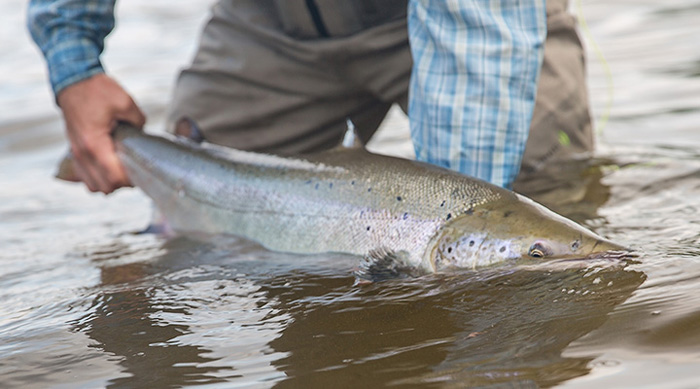
Ben releases a nice salmon in Old Tracadie pool on the Cascapedia, shortly before losing the fish of a lifetime. Photo Dave Cole, from Ben carmichael – ASF.
The escape of thousands of farmed salmon on the south coast of Newfoundland is a significant concern, as is the lack of public notification about the incident, the Atlantic Salmon Federation says.
Cooke Aquaculture confirmed Monday that over the course of four days last week between 2,000 and 3,000 salmon escaped from the company’s fish farm in Hermitage Bay.
The company said it alerted the province’s department of Fisheries and Land Resources, as well as the federal Department of Fisheries and Oceans, as soon as it saw the breech.
Five nations take the lion’s share of the world’s fish
Tracking data reveals that global fishing is deeply inequitable, raising fears for food security. Geetanjali Rangnekar reports.

Just a fraction of China’s devastating fishing fleet. A YouTube screen-shot.
Just five nations — China, Taiwan, Japan, South Korea and Spain — are responsible for 86% of the global fishing haul, new research shows.
An intensive study of tracking data from fishing vessels has revealed that those belonging to wealthier nations dominate the catch not only in international waters, but also in the exclusive economic zones (EEZ) of poorer nations.
The findings questions about the control and distribution of the global fishing catch, and could have long-term repercussions for food security and nutritional health.
Action Alert: Urge Congress to Authorize the Everglades Reservoir

The Everglades Foundation released a letter it sent to U.S. Senate Majority Leader Mitch McConnell (R-KY) urging him to schedule a vote on the Everglades Reservoir when the Senate reconvenes for legislative business on August 15.
“There is no other way to say this,” asserted Everglades Foundation CEO Eric Eikenberg in the letter. “Florida is being ravaged by a perennial algae crisis that is destroying our beaches, fisheries, tourism and real estate industries, and we are desperate.”
The letter seeks a Senate vote on S. 2800, America’s Water Infrastructure Act of 2018, which includes the biennial Water Resources Development Act. The measure seeks authorization of the Everglades Agricultural Area Reservoir, also known as the “Everglades Reservoir.”
The project will accommodate 240,000 acres of dynamic water storage, Eikenberg noted today, cleaning and moving an average of 370,000 acre-feet per year of water from Lake Okeechobee to the Everglades and Florida Bay, significantly reducing Lake Okeechobee discharges, which are the cause of the current algae crisis.
A red tide ravaging Florida may have killed a whale shark for the first known time
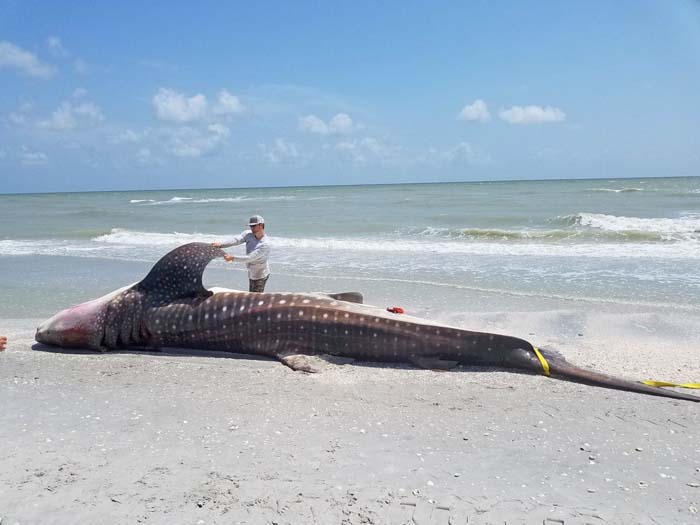
Biologists perform a necropsy on a whale shark that died in Florida waters. (Florida Fish and Wildlife Conservation Commission)
Speaking of Science
In late July, a whale shark washed up dead at Sanibel Island in Florida. The young adult male shark was 26 feet long and floating in the surf zone as soft waves lapped around its body.
Abby Jakoplic-Arnold, on vacation from Kansas City, Mo., happened to be on the beach when the shark was being removed. “At first we didn’t know if it was dead,” she recalled. “But it became pretty obvious when they flipped it over and blood was coming out of its gills.”
A biologist from the Florida Fish and Wildlife Conservation Commission sampled the shark’s muscle, liver, intestines and stomach contents. The muscles and organs tested positive for brevetoxin, a neurotoxin created by a harmful algae called Karenia brevis. This is the first time the commission has had an opportunity to sample whale shark tissue for this toxin.
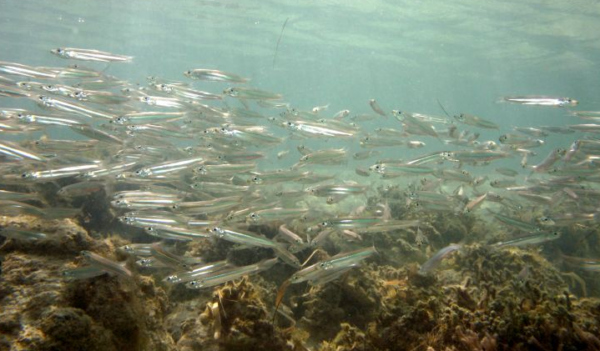
Featured Image Bait fish 2 by Clinton & Charles Robertson/Jacopo Werther – a commons image.


